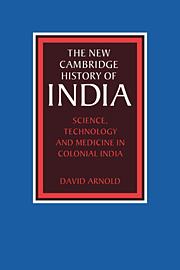Book contents
- Frontmatter
- 1 Introduction: science, colonialism and modernity
- 2 Science under the company
- 3 Western medicine in an Indian environment
- 4 Technologies of the steam age
- 5 Imperial science and the Indian scientific community
- 6 Science, state and nation
- Conclusion
- Biographical notes
- Bibliographical essay
- Index
- THE NEW CAMBRIDGE HISTORY OF INDIA
- References
5 - Imperial science and the Indian scientific community
Published online by Cambridge University Press: 28 March 2008
- Frontmatter
- 1 Introduction: science, colonialism and modernity
- 2 Science under the company
- 3 Western medicine in an Indian environment
- 4 Technologies of the steam age
- 5 Imperial science and the Indian scientific community
- 6 Science, state and nation
- Conclusion
- Biographical notes
- Bibliographical essay
- Index
- THE NEW CAMBRIDGE HISTORY OF INDIA
- References
Summary
Although there was no clear ideological or professional break between the science of the Company period and the science that followed under the Crown after 1858, there was a steady move away from the earlier modes of exploratory and observational science, in which the Company had taken an erratic interest, to a more confident alliance between science and the state. In the late nineteenth century the colonial regime employed science as both a means of self-legitimation and an aid to more effective government. While exploiting the authority and utility of Victorian science, the state remained none the less committed to a largely instrumentalist view of science: science existed to serve the empire, not to constitute an alternative source of authority or to dictate imperial priorities. However, from the 1890s through to the First World War there was unprecedented Indian interest in, and engagement with, Western science. With the growth of an Indian scientific community, India participated in international science in ways that belied any narrow definition of colonial science. The combination of these two elements – imperial science and an emergent Indian scientific community – did much to advance science in India in the critical decades of the 1890s–1900s to a position of intellectual and political prominence but also to fuel its inner tensions and contradictions.
SCIENCE AND THE SERVICES
Science played little part in the education and training of Indian Civil Service officers and, though a recreational interest in natural history often developed in the course of a career in India, there was always a suspicion of the professional scientist and a greater regard for the practical exercise of administrative authority. The ICS valued first-hand experience in the districts above the cosmopolitanism and intellectualism of science and regarded a close acquaintance with the villages and peoples of rural India and a grounding in the vernacular languages as a superior basis for knowing and ruling India.
- Type
- Chapter
- Information
- Science, Technology and Medicine in Colonial India , pp. 129 - 168Publisher: Cambridge University PressPrint publication year: 2000
References
- 1
- Cited by

